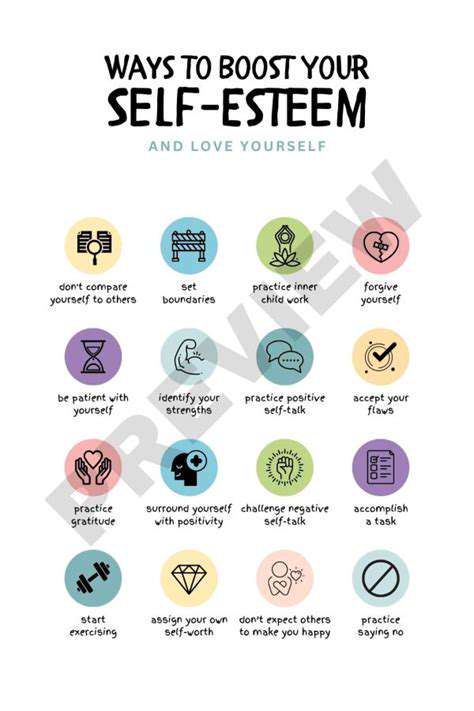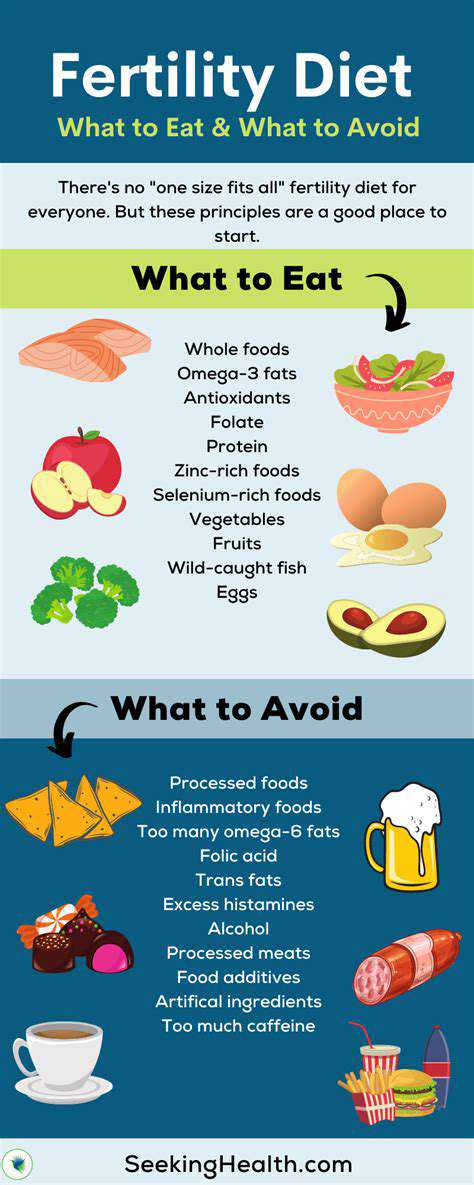Debunking 10 Common Nutrition Myths
Understanding Your Unique Metabolic Needs
The human body is a complex machine, and each individual possesses a unique metabolic profile. This profile, influenced by genetics, activity levels, age, and even stress levels, dictates how your body processes and utilizes nutrients. Understanding your metabolic needs is crucial for creating a sustainable and effective dietary plan. This involves considering factors like basal metabolic rate (BMR), which represents the energy your body expends at rest, and how your body responds to different macronutrients (carbohydrates, proteins, and fats).
Ignoring these individual variations is a common pitfall of one-size-fits-all diets. A diet that works well for one person might be completely ineffective or even detrimental to another due to these inherent differences. Approaching nutrition with a personalized lens is essential for long-term health and well-being.
The Role of Genetics in Dietary Requirements
Genetic predispositions play a significant role in how your body processes nutrients. Certain genes influence how efficiently you absorb vitamins and minerals, and how effectively your body utilizes carbohydrates, proteins, and fats. Understanding your genetic makeup can provide valuable insights into potential dietary sensitivities and preferences, enabling you to tailor your diet accordingly. This personalized approach allows for a more targeted approach to achieving optimal health.
Considering Lifestyle Factors: Activity Levels and Stress
Active individuals have different nutritional needs compared to those with sedentary lifestyles. The amount of energy expended during physical activity directly impacts the body's requirement for calories and specific nutrients. Stress levels also significantly influence your metabolic rate and nutrient utilization. Chronic stress can disrupt hormonal balance, which in turn impacts how your body processes food. A personalized diet must account for these lifestyle factors.
Beyond Macronutrients: The Importance of Micronutrients
While macronutrients (carbohydrates, proteins, and fats) are essential for energy and building blocks, micronutrients (vitamins and minerals) are equally vital for maintaining optimal bodily functions. These micronutrients are involved in numerous biochemical processes within the body, from supporting immune function to promoting healthy metabolism. A one-size-fits-all diet often falls short in addressing the specific micronutrient needs of individuals, potentially leading to deficiencies and health issues.
The Pitfalls of Fad Diets and the Importance of Sustainability
Fad diets often promise quick results but frequently fail to address the long-term needs of the body. They typically restrict certain food groups, leading to nutrient deficiencies and potentially creating unhealthy eating patterns. A sustainable dietary approach focuses on long-term well-being, incorporating a variety of nutrient-rich foods. This approach promotes a balanced intake of macronutrients and micronutrients, supporting optimal metabolic function and overall health.
The Power of Personalized Dietary Plans with Professional Guidance
Developing a truly personalized dietary plan requires professional guidance from registered dietitians or nutritionists. They can assess your individual needs, considering your medical history, lifestyle, and dietary preferences. Working with a qualified professional helps you navigate the complexities of nutrition, ensuring that your dietary plan promotes both short-term and long-term health goals. A personalized plan empowers you to make informed choices, promoting a deeper understanding of your body's unique needs.
The Quick Fix Fallacy: Sustainable Habits Over Overnight Transformations
The Allure of the Quick Fix
We live in a culture obsessed with instant gratification. Everywhere we turn, we're bombarded with promises of overnight transformations—miracle diets, rapid weight loss programs, productivity hacks guaranteed to boost our output in a single day. This relentless pursuit of quick fixes often leads us down a path of unsustainable practices. While a temporary boost might feel appealing, these approaches rarely address the root causes of our challenges, leaving us feeling frustrated and ultimately back where we started. This cycle of temporary fixes can hinder our ability to develop lasting, sustainable habits.
The idea of a quick fix often stems from a desire for immediate results. We crave the feeling of accomplishment that comes with seeing progress swiftly. However, this approach often ignores the crucial element of building a foundation of consistent effort and mindful adjustments. This is why short-term solutions rarely translate into long-term success. We need to shift our focus from fleeting transformations to cultivating sustainable habits that become integrated into our daily lives.
The Pitfalls of Overnight Transformations
The pursuit of overnight transformations often leads to unrealistic expectations and, ultimately, disappointment. These approaches typically lack the necessary time and emotional investment required for true, lasting change. Many quick fixes rely on restrictive diets, intense exercise regimes, or other practices that are difficult to maintain over the long haul. This inconsistency often results in a relapse back into old patterns, leaving us feeling defeated and discouraged.
Furthermore, these rapid transformations can be detrimental to our mental and physical well-being. They often involve extreme measures that can strain our bodies and minds. Sustainable change, on the other hand, focuses on gradual, manageable steps that align with our individual needs and goals. This approach not only promotes healthier habits but also fosters a sense of self-compassion and resilience.
Building Sustainable Habits for Lasting Change
Developing sustainable habits is about making conscious choices that align with our long-term goals. It involves understanding our individual needs and creating actionable steps that we can consistently incorporate into our daily routines. This process often necessitates a shift in mindset, moving from a focus on immediate gratification to a commitment to ongoing progress. We need to identify the root causes of our challenges and develop strategies for addressing them in a way that is both effective and manageable over time.
This often involves breaking down large goals into smaller, more achievable steps. Creating a supportive environment, whether through accountability partners, mentors, or supportive communities, can also significantly contribute to success. Ultimately, building sustainable habits requires patience, persistence, and a willingness to adapt and adjust our approach as needed. This approach fosters not just better outcomes but also a greater sense of empowerment and control over our lives.
Instead of searching for magic bullets, we should focus on cultivating sustainable routines that integrate well with our existing lifestyle. This approach prioritizes consistency and gradual progress, leading to lasting change and a more fulfilling life.
The No Carbs Controversy: Why Carbohydrates Aren't the Culprit

The Low-Carb Diet Trend
The no carbs diet trend has swept the nation, promising rapid weight loss and improved health. Proponents claim that drastically reducing carbohydrate intake can significantly alter metabolic processes, leading to better blood sugar control and even improved athletic performance. However, this approach is not without controversy, and its long-term effects remain a subject of ongoing debate.
Many variations of low-carbohydrate diets exist, ranging from strict elimination of all grains and sugars to more moderate approaches that allow for some carbohydrate consumption. The common thread, however, is the emphasis on reducing carbohydrate intake to promote weight loss and improve overall health.
Potential Benefits of Carbohydrate Restriction
Some studies suggest that low-carb diets can lead to significant weight loss in the short term. This is often attributed to the reduced caloric intake that often accompanies a decreased carbohydrate consumption. Furthermore, some proponents believe that restricting carbohydrates can improve insulin sensitivity, potentially reducing the risk of developing type 2 diabetes.
By reducing the body's reliance on glucose for energy, the body may start utilizing fat stores more effectively. This can lead to a feeling of increased energy and mental clarity in some individuals.
Potential Drawbacks of Carbohydrate Restriction
A significant concern surrounding low-carb diets is their potential impact on gut health. The elimination of many fiber-rich foods, which are crucial for a healthy gut microbiome, can disrupt the balance of beneficial bacteria. This can lead to digestive issues such as bloating, constipation, and diarrhea.
Furthermore, long-term carbohydrate restriction can lead to nutrient deficiencies. Many important vitamins and minerals are found predominantly in carbohydrate-rich foods like fruits, vegetables, and whole grains. A diet that severely restricts these food groups can result in a deficiency in essential nutrients.
The Role of Macronutrients in Overall Health
A balanced diet that includes adequate amounts of carbohydrates, protein, and healthy fats is essential for optimal health. Carbohydrates provide the body with the energy it needs to function properly. Protein is crucial for building and repairing tissues, and healthy fats are vital for hormone production and overall bodily functions.
Ignoring any one of these essential macronutrients can have adverse effects on health and well-being. Striking a balance is essential for sustaining long-term health and preventing nutrient deficiencies.
The Importance of Individualized Dietary Plans
Dietary needs vary greatly depending on individual factors such as age, activity level, and underlying health conditions. A diet that works well for one person may not be suitable for another. It's crucial to consult with a healthcare professional or registered dietitian before making significant dietary changes, especially if you have any underlying health conditions.
The Importance of Sustainability
A diet that is not sustainable is unlikely to have long-term benefits. Adopting a restrictive diet that is difficult to adhere to long-term is unlikely to achieve lasting results. It is essential to choose a dietary plan that aligns with your lifestyle and preferences, ensuring that you can maintain it for the long haul.
The Importance of Consulting Professionals
Before embarking on any significant dietary changes, including those that restrict carbohydrates, it is crucial to consult with a healthcare professional or registered dietitian. They can assess your individual needs and provide personalized recommendations to ensure that you adopt a healthy and sustainable dietary strategy. They can help you avoid potential pitfalls and ensure that your dietary changes are safe and effective for your specific circumstances.
Read more about Debunking 10 Common Nutrition Myths
Hot Recommendations
-
*Guide to Managing Gout Through Diet
-
*Best Habits for Financial Well being
-
*How to Build a Routine for Better Mental Health
-
*How to Eat Healthy on a Budget [Tips & Meal Ideas]
-
*Guide to Practicing Self Acceptance
-
*How to Incorporate More Movement Into Your Day
-
*Guide to Managing Chronic Pain Naturally
-
*Guide to Building a Reading Habit for Well being
-
*Top 5 Weight Loss Supplements That Actually Work
-
*Best Exercises for Postpartum Recovery [Beyond Abdominal Work]





![How to Start Lifting Weights at the Gym [Beginner Guide]](/static/images/26/2025-05/SettingRealisticGoalsandExpectations.jpg)





